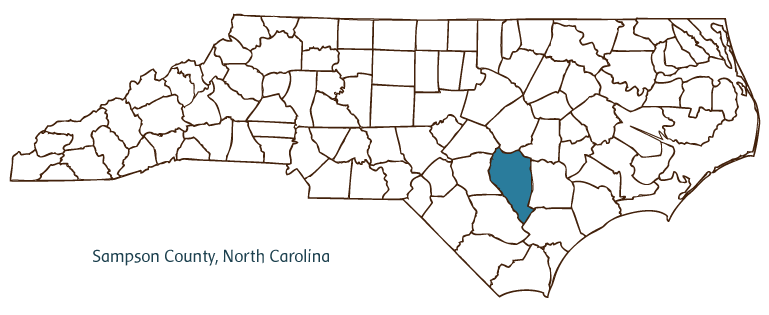SAMPSON COUNTY GOVERNMENT:
www.sampsonnc.com
COUNTY SEAT: Clinton
FORMED: 1784
FORMED FROM: Duplin
LAND AREA: 944.74 square miles
2020 POPULATION ESTIMATE: 59,036
White: 66.6%
Black/African American: 26.6%
American Indian: 3.7%
Asian: 0.6%
Pacific Islander: 0.3%
Two or more races: 2.3%
Hispanic/Latino: 20.6% (of any race)
From State & County QuickFacts, US Census Bureau, 2020.
CONGRESSIONAL DISTRICT: 7TH
![]() BIOGRAPHIES FOR
BIOGRAPHIES FOR
Sampson County
 WILDLIFE PROFILES FOR
WILDLIFE PROFILES FOR
Coastal Plain
GEOGRAPHIC INFORMATION
REGION: Coastal Plain
RIVER BASIN: Cape Fear, Map
NEIGHBORING COUNTIES: Bladen, Cumberland, Duplin, Harnett, Johnston, Pender, Wayne

See also: Hollerin' Contest.
Sampson County, located in the Coastal Plain region of North Carolina, was formed in 1784 from Duplin County and was named for Col. John Sampson, a member of the North Carolina House of Commons. Early inhabitants of the area included the Coharie Indians, followed by English, Welsh, and Scottish settlers. Clinton, the county seat, was incorporated in 1852 and was named after Richard Clinton, the foster son of John Sampson, the original owner of the land on which the town was built. Other communities in the county include Newton Grove, Suttontown, Turkey, Elliott, Harrells, Tomahawk, Parkersburg, Garland, and Keener. The Black River, Warrens Pond, Mingo and Starling Swamps, Dismal Bay, and Turkey and Wild Cat Creeks are a few of the county's significant physical features.
Notable among Sampson County's historic sites and landmarks are the Clinton Depot and Freight Station (ca. 1920); the Graves-Stuart House, built in the 1840s; the Archibald Monk House, built around 1824; and Thirteen Oaks, built in 1902. Cultural institutions include the Community Theatre Group, the Dr. Victor R. Small Cultural Arts Center, and the Sampson County History Museum. The county hosts festivals and annual events such as the National Hollerin' Contest in Spivey's Corner, the Fireman's Day Parade and Festival, the Sweet Potato Festival, and the Rotary Fair and Parade.
Sampson County produces agricultural goods such as tobacco, vegetables, cotton, corn, soybeans, swine, and poultry. Manufactured goods include lumber and lumber products, furniture, apparel, and animal feeds. The estimated population of Sampson County was 62,600 in 2004.
Annotated history of Sampson County's formation:
For an annotated history of the county's formation, with the laws affecting the county, boundary lines and changes, and other origin information, visit these references in The Formation of the North Carolina Counties (Corbitt, 2000), available online at North Carolina Digital Collections (note, there may be additional items of interest for the county not listed here):
County formation history: https://digital.ncdcr.gov/Documents/Detail/the-formation-of-the-north-ca...
Index entry for the county: https://digital.ncdcr.gov/Documents/Detail/the-formation-of-the-north-ca...
References:
Tom Butchko, An Inventory of Architecture of Sampson County, North Carolina (1979).
Additional resources:
Corbitt, David Leroy. 2000. The formation of the North Carolina counties, 1663-1943. https://digital.ncdcr.gov/Documents/Detail/the-formation-of-the-north-carolina-counties-1663-1943/3692099?item=4553233 (accessed June 20, 2017).
Sampson County Government: https://www.sampsonnc.com/
Clinton Sampson Chamber of Commerce: https://www.clintonsampsonchamber.org/
Sampson County resources, NC Digital Heritage Center: https://www.digitalnc.org/counties/sampson-county/
North Carolina Digital Collections (explore by place, time period, format): https://digital.ncdcr.gov
Image credits:
Rudersdorf, Amy. 2010. "NC County Maps." Government & Heritage Library, State Library of North Carolina.
1 January 2006 | Mazzocchi, Jay
